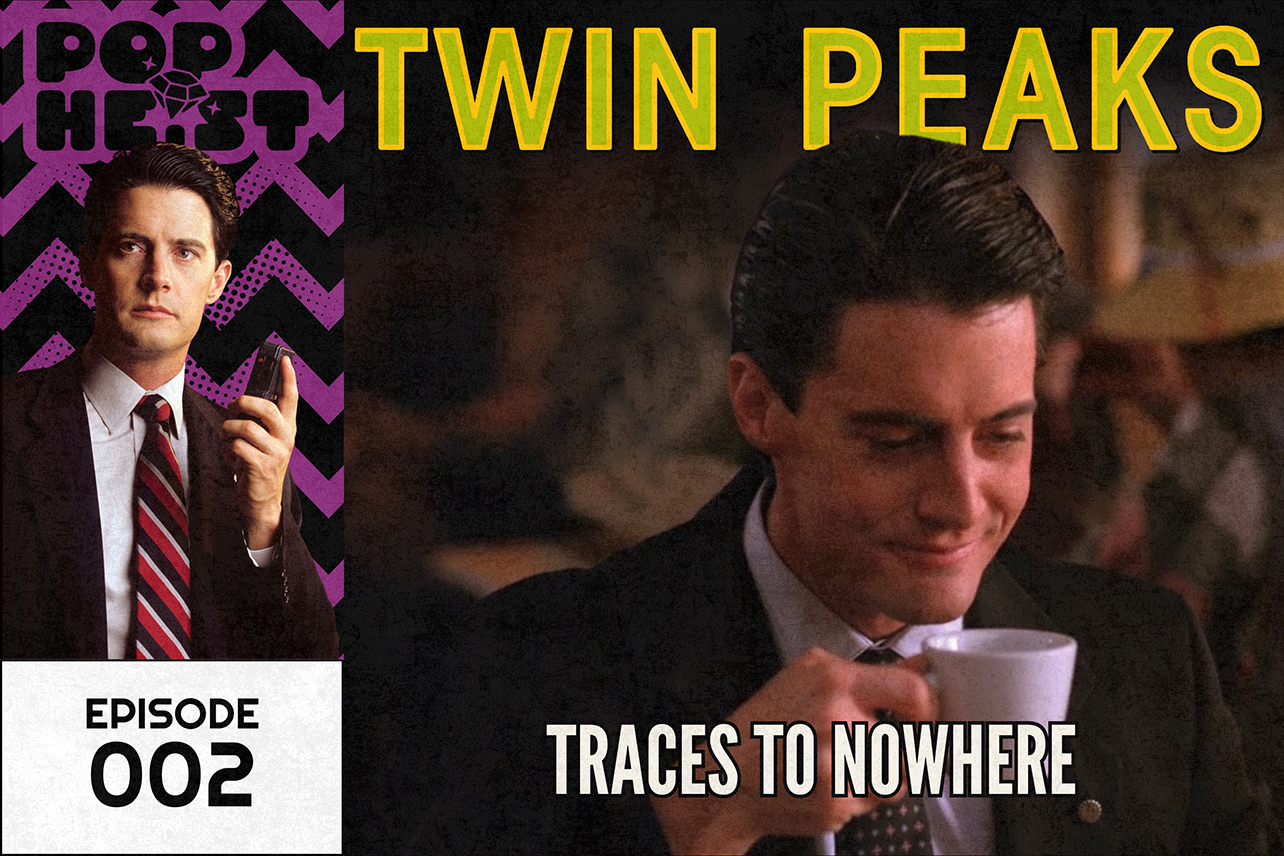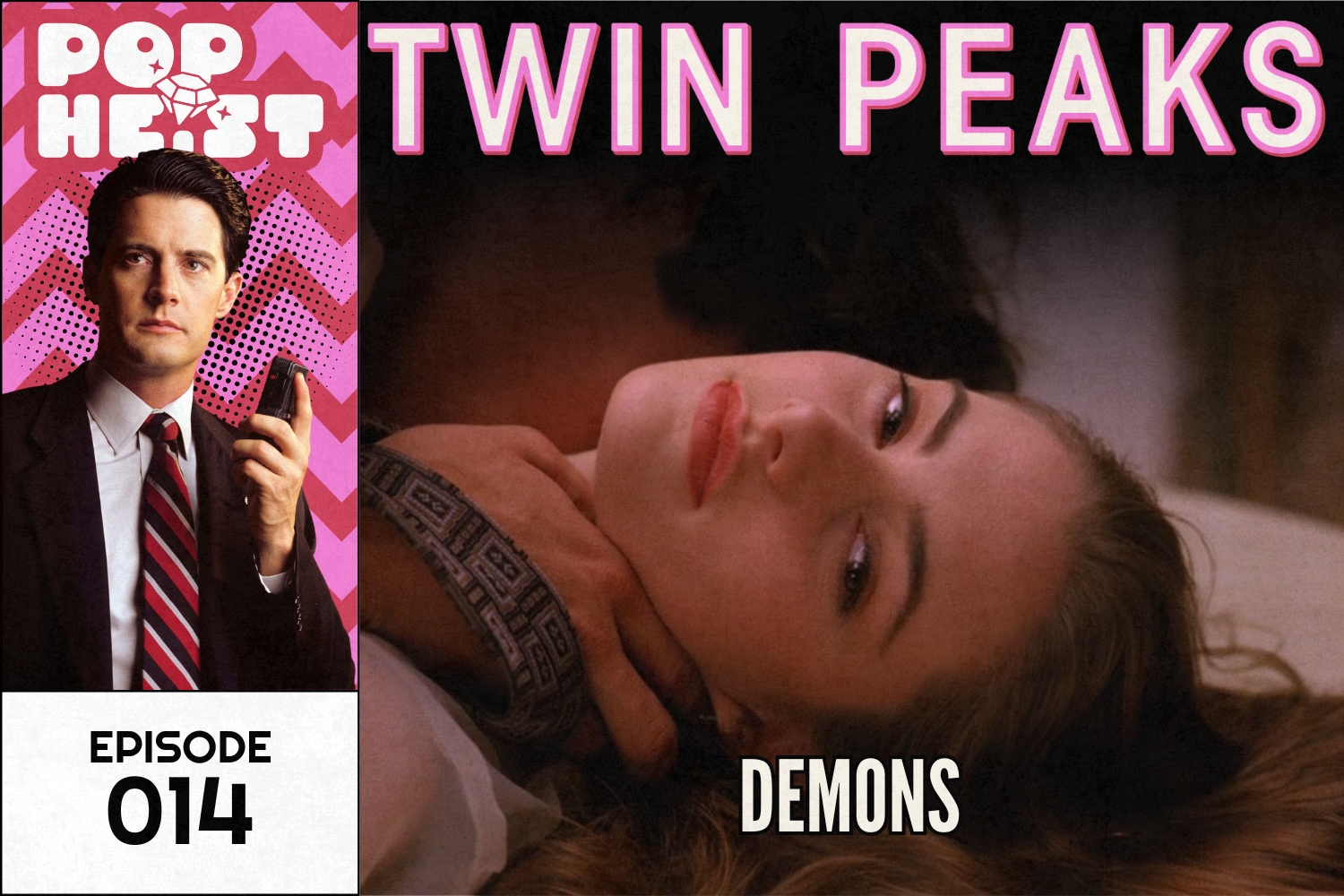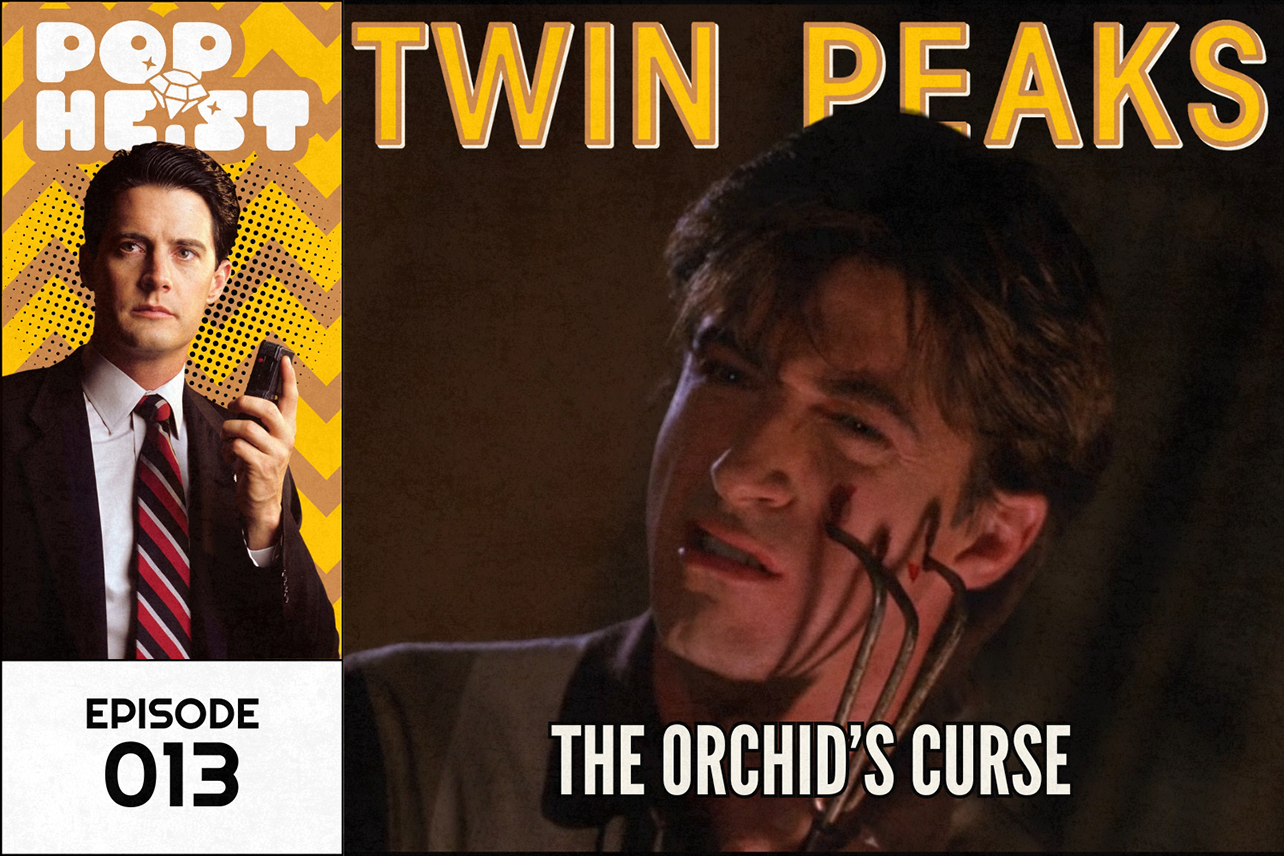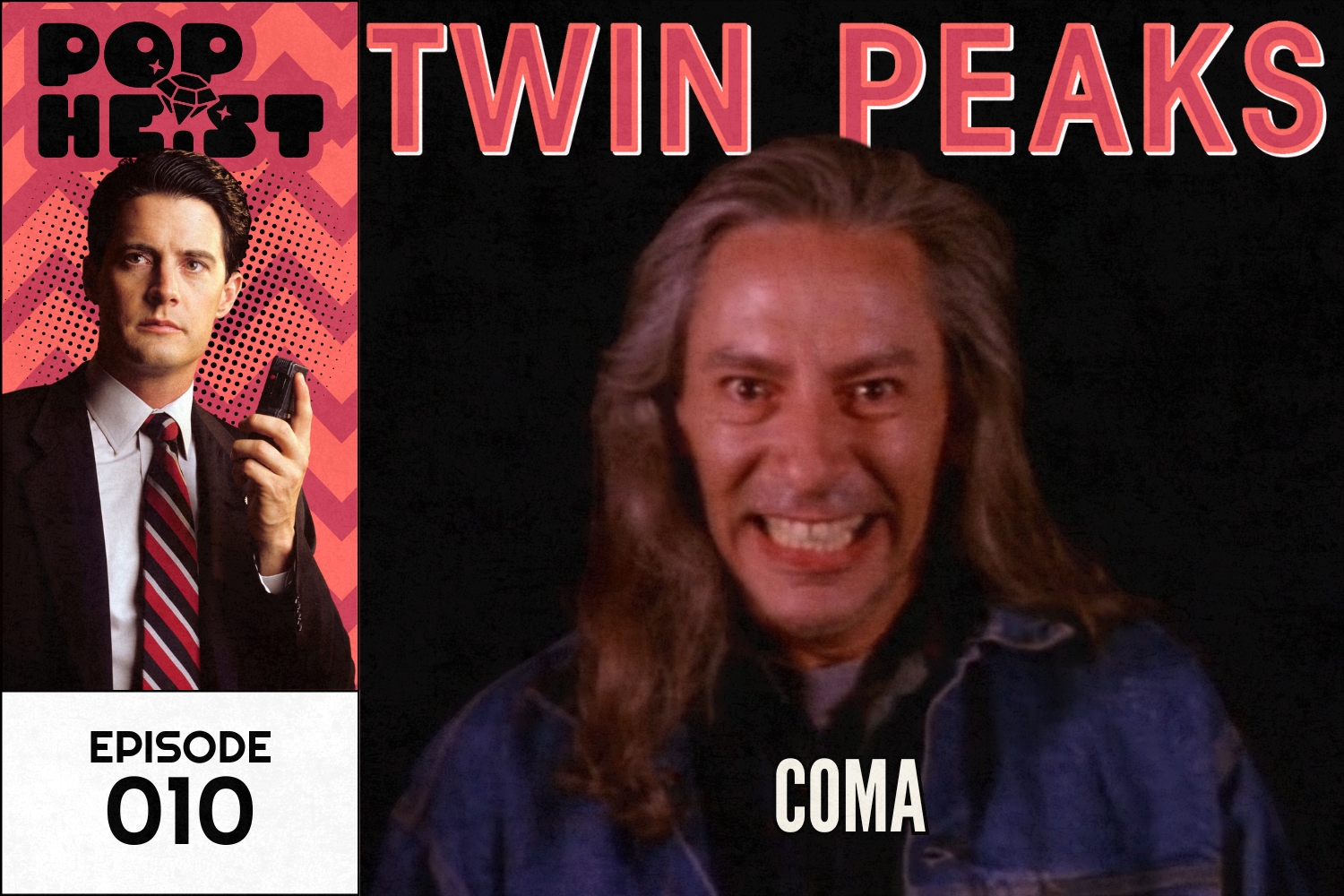In PRESTIGE PREHISTORY, Pop Heist critic Sean T. Collins takes a look at classic TV shows that paved the way for the New Golden Age of Television — challenging, self-contained series from writers and filmmakers determined to push the medium forward by telling stories their own way.
Twin Peaks Season 1, Episode 2
“Episode 1” aka “Traces to Nowhere”
[NOTE: The pilot episode of Twin Peaks is not numbered; this, the second episode, is officially designated “Episode 1”]
Original Airdate: April 12, 1990
Writers: David Lynch & Mark Frost
Director: Duwayne Dunham
Cast: Kyle MacLachlan, Michael Ontkean, Sheryl Lee, Mädchen Amick, Dana Ashbrook, Richard Beymer, Lara Flynn Boyle, Sherilyn Fenn, Warren Frost, Peggy Lipton, James Marshall, Everett McGill, Jack Nance, Ray Wise, Joan Chen, Piper Laurie, Eric Da Re, Harry Goaz, Michael Horse, Sheryl Lee, Russ Tamblyn, Grace Zabriskie, Don Davis, Mary Jo Deschanel, Charlotte Stewart, Gary Hershberger, Wendy Robie, Kimmy Robertson, Catherine E. Coulson, Al Strobel, Frank Silva
Twin Peaks is serious business, except for all the times that it isn’t. This is a challenge for the reviewer. Maybe you want to lead your piece on the show’s second episode (“Episode 1,” with the feature-length pilot standing on its own as a zeroth episode) with the ongoing grief of the friends and family of Laura Palmer. Maybe you want to focus on the sleazy suspects in her brutal murder, from the drug-dealing wife-abusing trucker Leo Johnson to the tropical, unethical psychiatrist Dr. Jacoby.
But maybe what you really want to lead with is Nadine Hurley triumphantly shouting “Cotton balls!” in the face of her husband Big Ed’s mistress, Norma, as she reveals her master plan for creating completely silent drape runners. Maybe it’s Pete Martell suppressing a chuckle as he informs his coffee-drinking guests, Agent Cooper and Sheriff Truman, that “There was a fish in the percolator!” In terms of lines that have become lodged in my memory from this show, those two goofball exclamations are up there with “Entering the town of Twin Peaks.” In a way, they are “entering Twin Peaks.”
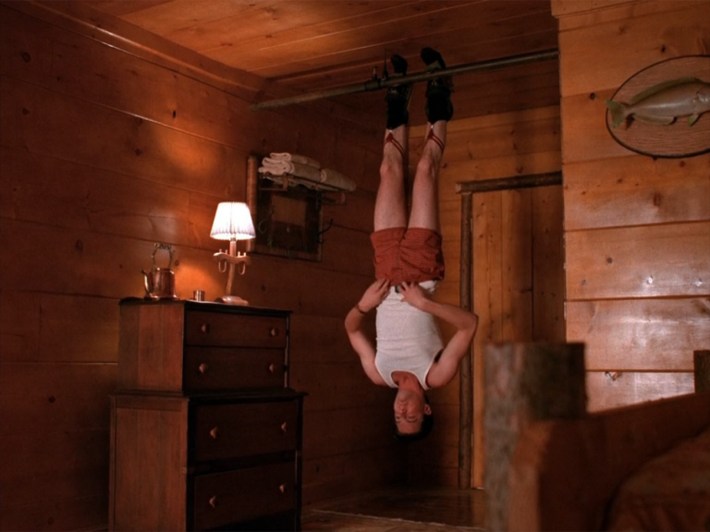
Consider the affect of affable Agent Cooper. Our man Dale greets us — well, Diane, his gal Friday back at the home office, we presume — while hanging upside-down from one of those contraptions Bruce Wayne uses to increase the circulation or what have you. He runs down every particular of his hotel room — the tobacco-free, Douglas fir–tinged odor, the softness of the bed, the quality of the water pressure in the shower. Coop pauses just long enough to descend from his bat-like perch before turning to the questions really troubling him that morning: “What really went on between Marilyn Monroe and the Kennedys? And who really pulled the trigger on JFK?”
Within a minute, he’s dropping one of the other most famous lines in the history of the show: “You know, this is — excuse me — a damn fine cup of coffee.” Later, over the phone, he enthuses to an FBI colleague about the roadside inn he stopped at on his way into town: “They got a cherry pie there that’ll kill you!” Our boy likes his treats, and that’s as important an ingredient in the Dale Cooper stew as his unparalleled skills of deduction, his boyish good looks, and the contrast between his by-the-books appearance and unorthodox way of thinking. It’s important that he’s goofy, as goofy in his own way as Norma and Pete are in theirs, or Lucy the squeaky-voiced receptionist at the Sheriff’s Department is in hers.
Or even Audrey Horne, though she may not read like that at first glance. After all, she’s being played by Sherilyn Fenn, a grown-ass adult (like the rest of the high-school “kids”) who happens to be one of the most beautiful women in the history of television. (You can repeat that same appellation several times with this cast.) Certainly Coop seems happy to see her walk his way.
But come on: the high schooler who fancies herself a femme fatale and dances sensually to moody vibraphone jazz but can’t resist playing childish pranks on her dad and his staff like she’s an obnoxious ten year old? The only person in town whose takeaway from Laura Palmer’s murder seems to be “How can I have some fun with this?” Just because she’s a cool character doesn’t mean she isn’t also a frightfully silly person.
Silliness does not immunize you from potential implication in the murder, mind you. In the episode’s final scene we catch up Dr. Lawrence Jacoby, the beardy doofus who made a hash of his first encounter with Coop last week. We join him in his ludicrous office, which is made up to look like the cover of a 1950s exotica album by Henry Mancini. He’s wearing a tie in the shape and likeness of a fish, percolators be damned. He’s carrying a fake coconut for crying out loud.
But he’s listening to secret tapes recorded for him by Laura, sounding alternately flirty and desperate. (It seems like those are the two modes between which she cycled as the end of her life approached.) She talks about her secret boyfriend: “God, James is sweet, but he’s so dumb!” This kind of blunt evaluation of a character we’re just getting to know, in such a way that we know it’s not a heat-of-the-moment insult but a genuine disappointment, is shocking in its honesty.
Just before Laura can talk about the “mystery man” she planned to meet, Dr. Jacoby puts on headphones. We don’t hear what she says, but whatever it is, it makes Jacoby cry. Fortunately, he has James Hurley’s half of Laura’s heart necklace — apparently he was the person who dug it up — to comfort himself with.
Attend secret sessions with Dr. Jacoby. That’s one item on Laura Palmer’s weekly to do list. By the end of this episode, we know of many, many others. Tutor Audrey’s disabled brother Johnny Horne. Help Josie Packard learn English. Deliver Meals on Wheels with Norma Jennings. Date Bobby Briggs in public. Date James Hurley in private. Go to high school. Become addicted to cocaine. Keep your friends and family in the dark as much as you possibly can. Somehow she managed to do all this and get voted Homecoming Queen. Meanwhile I have a one-appointment-per-day maximum before I have a nervous collapse.
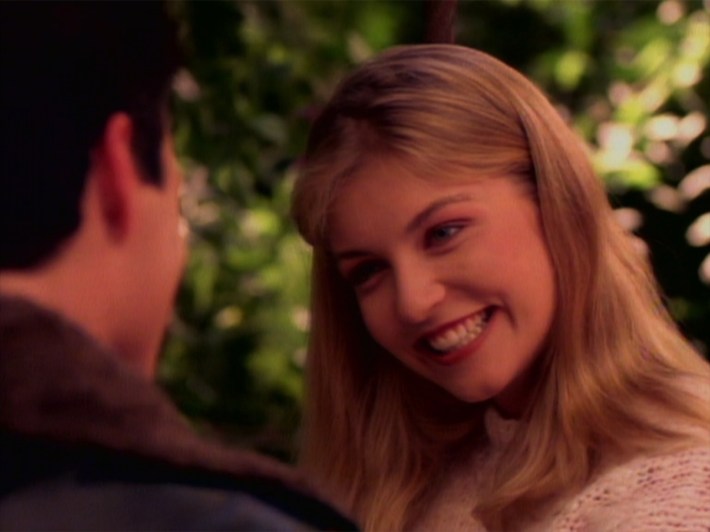
Maybe a nervous collapse is exactly what happened. Before he (and his opps Bobby and Mike) are released from jail, James tells Agent Cooper and Sheriff Truman that a change came over Laura a couple of days prior to her death. “Something scared her,” he says, saying she stopped talking to him and started doing coke again after a long period of sobriety. She hopped off his bike at the light at Sparkwood and 21, and that was the last he ever saw of her. His description matches that of someone balanced on the razor’s edge of mania and psychosis before they finally tip over.
What we hear about the night that followed her goodbye to James is grim. Doc Hayward, her best friend Donna’s dad, can barely bring himself to read Coop and Harry the details of her autopsy, which he found he was unable to conduct himself. She died of blood loss from multiple shallow wounds. There were marks indicating she’d been bound. There’s evidence that in the 12 hours prior to her death she had sex with at least three different men; I’m not sure if that includes the man who raped and killed her.
The grief is still very real for Doc Hayward, maybe more now that he’s seen the autopsy results than it was before. This is — was — his daughter’s best friend, the sweet kid who didn’t just volunteer for but actually founded the Meals on Wheels program in Twin Peaks. Whatever she was caught up in, it apparently killed her, and it hollows him out to say so.
His daughter Donna is still wrestling with her own grief, as well as a new feeling: guilt. Now that she and James have kissed, she tells her mom, she’s realized that it was he and she, not he and Laura, who were falling in love all along. That feeling, Donna says, is a betrayal of her best friend. But with her mother’s comfort, she’s able to move past this and bring James home to dinner to meet her folks. (The young biker even wears a sweater for the occasion. Aww.)
This scene of suburban manners, it should be noted, takes place immediately after a frightening scene of domestic abuse. In their still-unfinished home in the middle of nowhere, Leo Johnson shoves a bar of soap in a sock and confronts his diner-waitress wife, Shelly. His “favorite” blue shirt — a euphemism for “a shirt covered in blood that’s almost certainly evidence of a homicide” — has vanished from his laundry. Shelly knows, since she’s the one who found it and hid it rather than wash away potential evidence in Laura’s case. But she can’t say it, so she cowers in the corner, wrapped in plastic (!!!), and begs Leo not to hurt her before the scene cuts to black with thwack. Cue the Haywards and their 1950s domestic bliss.
Of course, Bobby Briggs and his buddy Mike, Donna’s erstwhile boyfriend, are waiting outside, stalking James. First he stole Bobby’s girlfriend, now Mike’s? No way are they gonna stand for that. It’s a good thing James asks his uncle, Big Ed, to call in some rough-sounding customers called “the Bookhouse Boys” for security. Bobby and Mike seem dangerous, especially now that we know they’re drug dealers working for Leo Johnson, and that they owe him the ten grand that Coop found in Laura’s safe deposit box. No way can they get that money now unless they resort to desperate measures.
Ed, however, has his own problems, and we’re not just talking the Nadine/Norma love triangle. During the rumble with Mike and Bobby at the Roadhouse, he lost consciousness before he so much as threw a punch, leading him to suspect he was drugged by the bartender, Jacques Renault. Are either man connected to the Palmer case, or is this something else entirely?
“Something else entirely” abounds in this town, at least as far as we know. It seems unlikely, for example, that Laura Palmer was murdered to further the nefarious plans of local business magnates Ben Horne and Catherine Martell. Apparently having seen each other on the sly for a long time, enough for a toe-sucking rapport to be established at any rate, the pair are now colluding to torch her family sawmill, now under the control of her hated sister-in-law Josie, so that Ben’s expansion plans can continue apace.
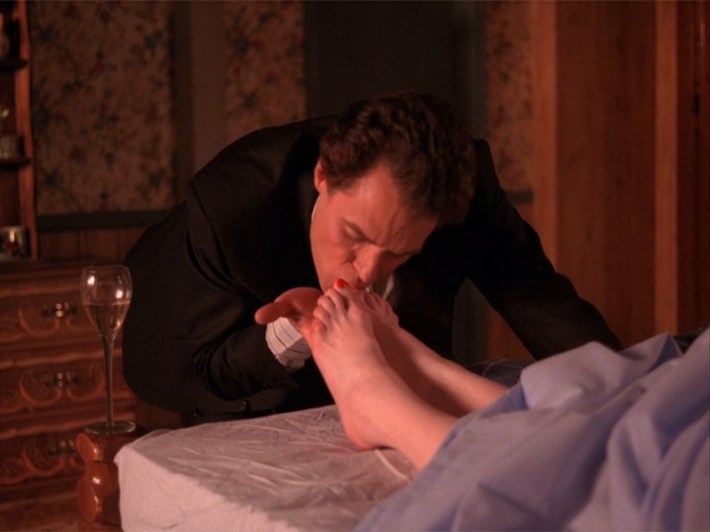
This seems like a much happier aspect of Ben’s life than fatherhood. He and Audrey are openly at odds, especially now that he knows she torpedoed his business deal with those Norwegians by mentioning the murder. “Laura died two days ago — I lost you years ago,” he says as he walks away from her, with what sounds like real pain. (Does he know, I wonder, that the killer’s surviving victim, Ronette Pulaski, worked at the perfume counter of his department store, just as her dad was working at Catherine’s mill?)
Bobby Briggs, too, is experiencing some strife with the parental units, in the parlance of our times. His father, Air Force Maj. Garland Briggs (Don Davis), is a kind-seeming but stern man with an ornately formal manner of speech that makes him sound like he’d be at home walking the muddy main thoroughfare of Deadwood. At one point he refers to “our beclouded and tempestuous existence.”
The Major is in the middle of delivering a big speech about understanding and respecting the need of young men to rebel when Bobby takes things a step too far and pulls out a cigarette. Maj. Briggs literally slaps it out of his mouth. You ever get the feeling that with the apparent exception of the Haywards, the people of Twin Peaks are struggling to raise their children?
Sarah Palmer no longer has even the dubious honor of being able to do poorly by her daughter. Laura is gone. Sarah, however, can’t accept it. Repetitively wailing “I miss her so much” like a mantra, she then hallucinates that Donna, who has come to visit her, is in fact Laura. But she’s barely hugged her “daughter” when she has a terrifying vision or flashback: In one of the most frightening shots in television history, the show jump-cuts to reveal a bearded, denim-clad man with long gray hair, hiding behind the foot of Laura’s bed. (Feel free to tell him “We’ve met before, haven’t we?” if you paid close attention to the reflection in the Palmer’s mirror at the end of the pilot.)
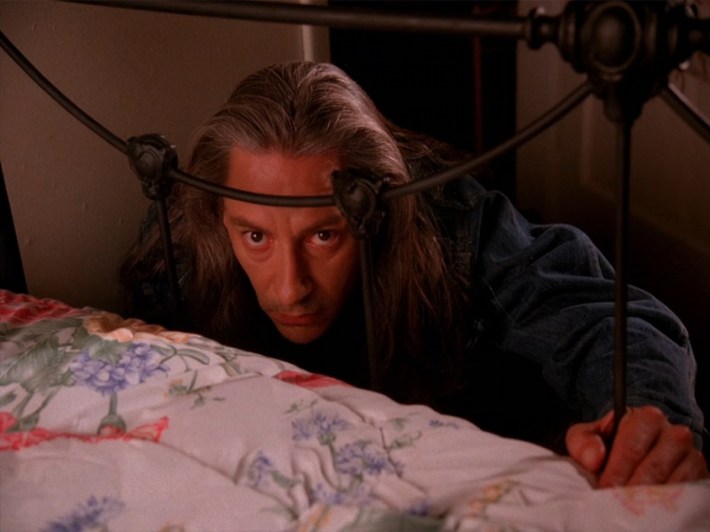
Two colorful characters make brief but memorable returns. The one-armed man we previously saw hanging around the hospital is back again; Deputy Tommy “Hawk” Hill (Michael Horse), a Native member of the Sheriff’s Department, tracks him into an employee-only area saturated in blue light, leading only to either oxygen storage or the morgue. And the Log Lady makes the acquaintance of Coop, whose failure to ask her log direct questions leads her, or it, to refuse to divulge what, uh, they know about the case. On the upside, this takes place at the Double R diner, where Coop once again falls in love with a slice of cherry pie.
“It’s like I’m having the most beautiful dream and the most terrible nightmare all at once,” Donna says to her mother. She’s talking about the crazy-making feeling of grieving your best friend while you and the boy she loved fall in love in turn. It’s especially painful now that a gauzy flashback has revealed just how happy James made Laura. But the statement alone serves as a signpost for the episode, and for the series. In this episode that dichotomy is best encapsulated in a freeze-frame of Laura in that video she and Donna shot with James: Frozen in an eternal Mona Lisa smile, her disembodied voice groans “Help me.”
Director Duwayne Dunham, who collaborated with Lynch as an editor both before and after working on Twin Peaks’ original run, clearly knows Lynch’s stuff well. His shot compositions for the one-on-one heart-to-hearts echo the quietude of Lynch’s own approach, against which surreal flourishes, like the blue glow on Hawk in the hospital, or scary ones, like the sudden appearance of that man behind the bed, pop more brightly.
He also respects that this is a show about people experiencing pain over Laura Palmer’s murder, not just trying to solve it: The sympathetic way he shoots characters like Sarah and Donna as they each grieve in their own way are among the show’s most memorable so far. Granted, “so far” means two episodes. But what episodes! From the mesmerizing opening credits on down, Twin Peaks asks you to quietly sit with whatever it’s doing — gags and bits, soapy melodrama, serial-killer horror, coping with loss, ranting about cotton-ball-powered drape runners — and listen to the screams, or the sighs, or the silence.
If you haven't already, consider supporting worker-owned media by subscribing to Pop Heist. We are ad-free and operating outside the algorithm, so all dollars go directly to paying the staff members and writers who make articles like this one possible.
